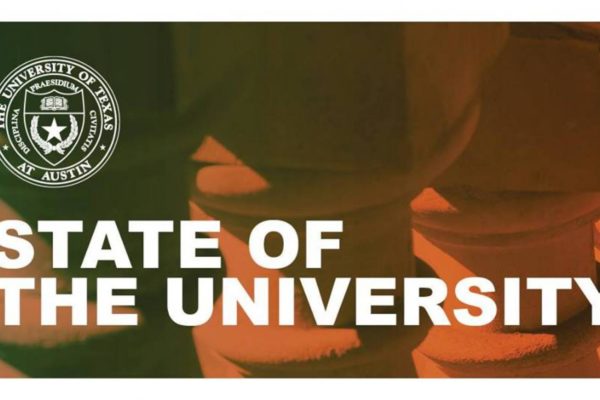AUSTIN, Texas — The University of Texas at Austin has expanded a new financial aid commitment for middle and low-income students to include all sophomores, juniors and seniors, as well as incoming freshmen, President Gregory L. Fenves announced in the 2018 State of the University address.
Speaking to the UT community as he begins his fourth year as president, Fenves also announced that the university will build a new career and development center for students in the Flawn Academic Center at the heart of campus.
“Our responsibility to UT students starts with access, then moves to graduation, but it doesn’t end with graduation,” Fenves said. “It continues with upward mobility — and the opportunity for our students to achieve the American Dream.”
Fenves outlined his vison for how UT Austin can become the best public university in the nation, stating that the “one overarching aspiration that reflects the ethos of our university is to be the best.” He highlighted three broad ways to achieve this goal:
- Provide increased financial support to UT’s students.
- Commit to advancing faculty careers and scholarship, as the university has done by making faculty compensation more competitive and by introducing a new multidisciplinary research program, Bridging Barriers.
- Serve the state and create a more vibrant Texas by contributing to knowledge and progress across disciplines — from health care to the arts, sciences, education, humanities and business.
To achieve these goals, the university this past spring introduced the Texas Advance Commitment, which enables incoming Texas students with family incomes of up to $100,000, who have financial need, to receive guaranteed support. Eligible students with family incomes of up to $30,000 will receive, at a minimum, enough aid to completely cover full tuition costs.
At the address, Fenves announced that these financial aid awards will not only be distributed to new UT students, but to all eligible undergraduate students currently on the Forty Acres, meaning sophomores, juniors and seniors.
“Everyone’s a part of this commitment now,” he said.
The university will also build a new, university-wide career and development space for students called the Center for Career Exploration and Development. This new center will add to the successful career placement work at individual colleges and schools and will provide additional resources to help students succeed after graduation.
The university is making steady progress to meet its initial goals of transforming health care, said Fenves. The Dell Medical School now has three classes of students and nearly 300 residents and fellows. It has its own clinics serving area patients, and the medical school recently earned a planning grant for the redesign of the Austin State Hospital as the cornerstone for person-centered mental health care.
Fenves in the speech also announced UT’s second Bridging Barriers grand challenge: “Whole Communities — Whole Health.”
Faculty members from across the university will work together to explore ways to foster the healthy development of children and families, struggling with adversity, by fundamentally rethinking how cohort studies are conducted on social, behavioral and health issues. These efforts come on top of the existing “Planet Texas 2050” grand challenge through which 100 researchers from 13 colleges and schools are addressing the scientific, economic and social issues that Texas will face for generations to come.
Transforming health in Texas is one way the university serves the state, and increasing educational opportunity is another, said Fenves.
“But there are so many other ways that we make Texas a more vibrant place for all who live here,” he added, citing recent examples in the fine arts, supercomputing and college-readiness programs for Texas high school students.
“As we serve Texas, we elevate all of the learning, teaching and research that we undertake,” said Fenves, “for the benefit of the people of Texas and our society as a whole.”
For a full transcript of his speech, please visit the president’s website.




